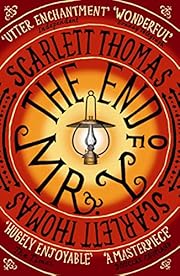

Click on a thumbnail to go to Google Books.
|
Loading... The End of Mr Y (original 2007; edition 2008)by Scarlett Thomas (Author)
Work InformationThe End of Mr. Y by Scarlett Thomas (2007)

Books Read in 2016 (1,215) » 5 more No current Talk conversations about this book. I require a very high bar for spec fic books based predominantly on quantum mechanics, but I think Thomas did a very good job here. She clearly learned her stuff, and uses it sparingly and deeply when used. I'm less a philosophical expert, but it seemed to be handled similarly. All of that being said, while many books use quantum mechanics in service to the plot, Thomas seems to be writing more of a Sophie's World style, where the plot exists to advance her thoughts on quantum mechanics and philosophy. While this seems to have turned a lot of people off, I found her completely forthright about it: this is a book about a main character who is writing her thesis about novels that are thought experiments. This is a novel that is a thought experiment: let's say we could enter thoughts. If that were possible, what would it mean for how thoughts are made? What would that say about what it means to be conscious? Is what we learned from this thought experiment generalizable even in a universe where thoughts aren't a manifest place that can be visited? Those are fun questions to ask and explore. When she veers away from that core, the book really falls flat (the love story? The random officemate who was into evo bio and got totally dropped, even though I really wanted her to integrate into the main plot line?), but that's OK, because it's not supposed to be a proper novel. My only real complaint is the ending kind of petered out. I thought Thomas had interesting thoughts about what it means to think, what defines consciousness and whether emergent consciousness is possible. I was intrigued by the thought process of whether defining phenomena mathematically instantiates them or merely defines them and I think she explores this in a particularly deft and nuanced way. from the book cover, i was expecting a whimsical victorian fantasy, or at least a light read perfect for when i need perking up... a couple of chapters in and i was getting annoyed that i've been misled...but then i got sucked in...and the book never let me go. i almost do not want to describe anything about this book. it's spent so long on my bookshelves that i have forgotten what it was about...and discovering the content as i read it was wonderful. there's actually barely a plot or character development. the book is fluffed by meandering reflections and discussions on physics, philosophy, religion and on the relationship between reality and language...i think... at times it got too overindulgent, but nothing unforgivable. i dont think it was ever preachy. reading it felt more like having a drunken discussion with friends at university when we were young/foolish enough to think we can actually figure out the big questions looming before us (how wrong we were!)... there's a lot of ideas in the book that i would love to read again. among them is the idea that a book is actually a thought experiment, where we see the world through the eyes of the characters (a kind of telepathy with the fictional world). and as we shift through the perspectives of the different characters, we eventually see through the eyes of the author living in their own time (a kind of telepathy in the real world!). i really liked that ^_^ from the book: "Let me become part of a book; I'd give anything for that. Being cursed by the End of Mr.Y must mean becoming part of the book; an intertextual being: a book-cyborg, or...perhaps a bibliorg."
Thomas writes with marvelous panache, although I wish she indulged less in her earnest calls for homeopathy and animal rights. Amid all the novel’s engaging questions about the nature of reality, it’s hard to get worked up about a subplot that has Ariel traveling through time to save laboratory mice. Still, she spins Derrida and subatomic theory into a wholly enchanting alternate universe that should appeal to a wide popular audience, and that’s something no deconstructionist or physicist has managed to do. Consider “The End of Mr. Y” an accomplished, impressive thought experiment for the 21st century. Belongs to Publisher Seriesrororo (24627) Is contained in
A cursed book. A missing professor. Some nefarious men in gray suits. And a dreamworld called the Troposphere? Ariel Manto has a fascination with nineteenth-century scientists--especially Thomas Lumas and "The End of Mr. Y, "a book no one alive has read. When she mysteriously uncovers a copy at a used bookstore, Ariel is launched into an adventure of science and faith, consciousness and death, space and time, and everything in between. Seeking answers, Ariel follows in Mr. Y's footsteps: She swallows a tincture, stares into a black dot, and is transported into the Troposphere--a wonderland where she can travel through time and space using the thoughts of others. There she begins to understand all the mysteries surrounding the book, herself, and the universe. Or is it all just a hallucination? No library descriptions found. |
LibraryThing Early Reviewers AlumScarlett Thomas's book The End Of Mr. Y was available from LibraryThing Early Reviewers. Current DiscussionsNonePopular covers
 Google Books — Loading... Google Books — Loading...GenresMelvil Decimal System (DDC)823.92Literature English & Old English literatures English fiction 1900- 2000-LC ClassificationRatingAverage: (3.76) (3.76)
Is this you?Become a LibraryThing Author. |
|||||||||||||||||||||||||||||||||||||||||||||||||||||||||||||||||||||||||||||||||||||||||||||||||||||||||||||||||||||||||||||||||||||||||
The problem with the text is it needed some editor work, there are inconsistencies and scenes that feel a bit tacked on, not as realistic. (